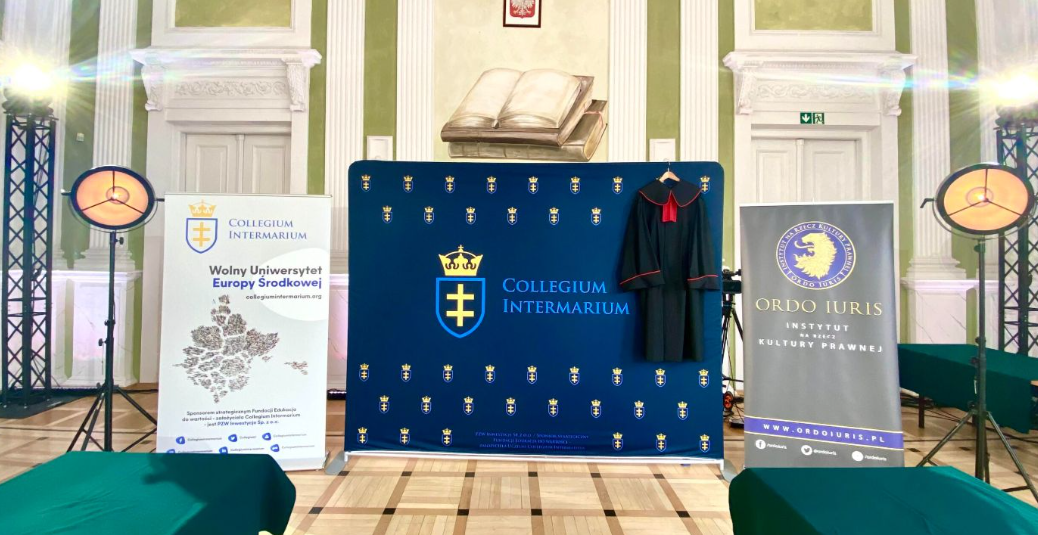No students enroll at conservative Polish university established under PiS government to “forge elites”

Keep our news free from ads and paywalls by making a donation to support our work!
Notes from Poland is run by a small editorial team and is published by an independent, non-profit foundation that is funded through donations from our readers. We cannot do what we do without your support.
Collegium Intermarium, a university set up in Warsaw under the former national-conservative Law and Justice (PiS) government with the aim of “forging elites for the entire region”, has not enrolled a single student this year.
However, the organisation behind the university, conservative legal group Ordo Iuris, claims that the problems it is suffering are because it is being deliberately “destroyed” by the new government that took power from PiS at the end of last year.
W tym roku założona przez Ordo Iuris uczelnia Collegium Intermarium na wydział stacjonarnego prawa nie przyjęła ani jednego nowego studenta.@donald_PL_ pic.twitter.com/AReEACBe6c
— Kuba Gawron 🏳️🌈🇪🇺🇺🇦🇵🇱 (@KubaGawron81) October 28, 2024
According to information obtained this week from the higher education ministry by activist Jakub Gawron, Collegium Intermarium enrolled no students for the new academic year, which began in October, for its only full-time programme, law. Last year, only one student was accepted onto the course.
According to the data provided this year, only two students in total are currently enrolled in the law programme after starting their studies in previous years.
Those figures come despite strong political and financial support from the PiS government for Collegium Intermarium. Its launch in 2021 was attended by the then education, Przemysław Czarnek, and then culture minister, Piotr Gliński, as well as by Hungary’s then justice minister, Judit Varga.
Czarnek said at the event that Collegium Intermarium would bolster the struggle against the “absurd ideologies” of “postmodernism and neo-Marxism”.
The university itself said it would “become a forge of elites for the entire Intermarium region”, referring to the area of Central and Eastern Europe between the Baltic, Black and Adriatic Seas.
According to data obtained by broadcaster TVP, in the years 2022-2023, the college received over 4.6 million zloty in funding from the education ministry, despite the fact that it enrolled only 15 full-time students for its first two academic years. Most of those subsequently did not complete their studies.
W przeliczeniu na studenta to więcej niż czesne na Harvardzie.
Ciekawe czy poziom nauczania też jest wyższy. https://t.co/JtzW3RyinZ #wieszwiecej
— Radosław Sikorski 🇵🇱🇪🇺 (@sikorskiradek) March 18, 2024
However, in a statement published on Tuesday this week – the day after Gawron shared the ministry’s data – Collegium Intermarium’s rector, Artur Górecki, and Ordo Iuris’s president, Jerzy Kwaśniewski, declared that their institution was being “destroyed by the government”.
They claimed that, in its first three years, the university had been a “success”, with “over 400 people having benefited from the university’s educational offer”. The vast majority of those have attended postgraduate programmes run by Collegium Intermarium separately from its full-time law studies.
Among the programmes it currently offers are courses in the “Psychology of Marriage and Family”, “Thomas Aquinas Studies”, “Faith and Science”, and the Latin language.
Górecki and Kwaśniewski claimed that the college was “established and financed exclusively by a private investor” and had always been intended to follow the “Anglo-Saxon model…of small elite universities” that “educate up to a dozen or so people a year”.
🔴Od prawie 4 miesięcy trwa bezprecedensowy atak administracji rządowej na @CollegiumI .
🔴To realizacja gróźb formułowanych przez rząd już od stycznia 2024 roku poprzez umieszczenie uczelni na „czarnej liście Sienkiewicza”, a następnie medialny atak na nią i jej byłego rektora… pic.twitter.com/eWzArR7tJm
— Instytut Ordo Iuris (@OrdoIuris) October 29, 2024
In their statement, they said that the new government had put Collegium Intermarium on a “blacklist” and “attacked the foundations of its functioning” by ordering ten inspections and suspending previously agreed financing for research programmes.
They also claimed that a state agency from which the university had rented its headquarters had “refused to bring the premises to a state of full suitability for educational purposes, leading to the termination of the agreement”.
“Today, only massive support for the university can save it,” wrote Górecki and Kwaśniewski. “We believe that the idea of Collegium Intermarium can still be saved.”

Notes from Poland is run by a small editorial team and published by an independent, non-profit foundation that is funded through donations from our readers. We cannot do what we do without your support.
Main image credit: Collegium Intermarium (press materials)

Alicja Ptak is senior editor at Notes from Poland and a multimedia journalist. She previously worked for Reuters.






